Come see just how deep
our roots run in Collin County. Explore our archive of
historical marriage licenses, some of which date back to 1884, as well as
school census records and a complete listing of
Collin County Elected Officials both past and present. In addition, we have provided access to
birth indexes,
death indexes and
marriage indexes.
Need a copy for a project or family album? Certified copies are available for a small fee.
Ready to get started? Just click on the links above and let us know where you would like to go today.
For more information on the available records you may contact us by email at
genealogycorner@collincountytx.gov or by calling our Vital Records Department at 972-548-4185.
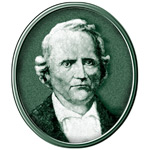
Collin McKinney is the namesake of both the county and county seat. You're invited to watch the short video
Collin McKinney: Man of Vision to learn more about his legacy.
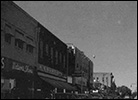
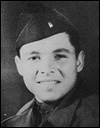 Men and Women from Collin County in the Armed Forces during World War II is a publication recognizing the Collin County citizens who served their country in various capacities throughout the second World War. It includes a picture and a brief bio of each service member including Audie Murphy, the most decorated soldier of WWII. To search its contents, click on Audie Murphy's photo then enter the first and/or last name of the person you are researching.
Men and Women from Collin County in the Armed Forces during World War II is a publication recognizing the Collin County citizens who served their country in various capacities throughout the second World War. It includes a picture and a brief bio of each service member including Audie Murphy, the most decorated soldier of WWII. To search its contents, click on Audie Murphy's photo then enter the first and/or last name of the person you are researching.
Do you know how the City of Frisco got its name? What famous outlaws used to frequently visit their cousin's house in McKinney? Visit our
Did You Know? section to find these other interesting facts about the very colorful history of Collin County.
Collin County History
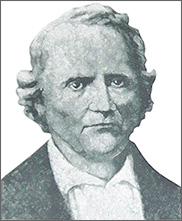
Collin McKinney was on the committee to draft the
Texas Declaration of Independence, and as the oldest member of the convention, at seventy, he was given the pen after the signing.
Collin McKinney was responsible for the way Texas was divided up into counties. He determined the maximum distance it would take someone to travel to the county seat, which led to the determination of county boundaries and the number of counties. He is also credited with insisting that as new counties were delineated in North Texas, the boundaries should be straight.
Buckner (where Trade Days is held) was the county seat, but later moved to McKinney when it was determined that Buckner was not at the physical center of the county.
The
Muncey Massacre was the last Indian raid in Collin County in 1844. Along with the deaths of the Munceys, two other Muncey boys disappeared, presumed stolen, and were never found. Although Indian raids continued well into the late 1800's, and were fought by Texas Rangers, the Muncey Massacre was the last Indian raid in Collin County.
Collin County voted against secession from the Union prior to the Civil War, though Texas in total voted for the Confederacy.
Collin County had only three legal hangings before the state took over that responsibility in 1922. All three were found guilty of murder.
By the end of the 1920's, 13 communities had electricity, natural gas, and a telephone exchange. Three had a population of over 1,000.
By the mid 1950's, the average value of farmland per acre increased from $58.91 in 1940 to $145.52 in 1954.
The estimated population of Collin County was only 150 when it was demarked from Fannin County on April 3, 1846.
One of the first, if not the first, cattle brands registered in Collin County was to a woman named Lucy Elston in July 1869.
Preston Road, formerly the old Shawnee Trail, is one of the oldest North - South roads in all of Texas. This one road served pioneers, stage coach lines, soldiers, Native Americans, and, of course, cattle.
In 1930, Xiphactinus audax Leidy, a 12'10” fossil fish from the Cretaceous of Texas, approximately 65,000,000 years old was excavated from Haw Branch, 4.6 miles east of Celina.
Frequent visitors to McKinney were Jesse and Frank James and their James Gang, who came to McKinney to visit their cousin "Tuck" Hill, whose historic house still stands just west of downtown.
In 1904, the residents of a new town called Emerson chose to rename it
Frisco City in honor of the St. Louis-San Francisco Railway on which the town was founded. It was later shortened to its present name of Frisco.
Plano comes from the Spanish word for "flat."
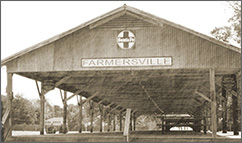 The historic Onion Shed, restored in 2002, was one of several onion sheds in Farmersville, built by the railroads for the packing and shipping of the Colln County Sweets The smell of onions permeated the town. The Collin County Sweets were mild onions, popular for their sweet flavor. In 1925 local farmers began planting onion crops, and by 1935 Farmersville was known as the "Onion Capitol of North Texas.”
The historic Onion Shed, restored in 2002, was one of several onion sheds in Farmersville, built by the railroads for the packing and shipping of the Colln County Sweets The smell of onions permeated the town. The Collin County Sweets were mild onions, popular for their sweet flavor. In 1925 local farmers began planting onion crops, and by 1935 Farmersville was known as the "Onion Capitol of North Texas.”
Cattle weren't the only livestock branded in Collin County. There was a marking for turkeys too since they tended to roam.
Plano's Quincentennial Bur Oak, estimated to be over 500 years old, resides in Bob Woodruff Park.
The Central National Road was the area's first road, extending from John Neely Bryan's crossing on the bank of the Elm Fork of the Trinity River in Dallas County to Travis Wright's landing on the south bank of the Red River opposite the mouth of the Kiarnichi River. The road crossed through Collin County just west of the present site of Josephine and connected with existing roads that enabled international traffic between St. Louis and San Antonio. The road literally put Collin County on the map
In 1888, J.C. Hubbard founded a town he named Josephine for his daughter.
Outlaw
Belle Starr (1848-1889) declared herself the "bandit queen" for her career as a cattle and horse rustler in Texas and Oklahoma. According to the legend she was a lovely lady who ruled outlaw gangs with her guns, her will and her personal favors. This amoral, amorous adventuress associated with the James boys and the Youngers.
During
World War II Princeton was one of 120 Texas towns to house a camp for
prisoners of war. The city employed the prisoners to make improvements, including enlarging the public park.
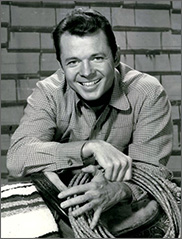 An Audie L. Murphy Memorial is located at Farmersville. He was born in Kingston, TX. At the time of his death Murphy was the most decorated combat soldier in United States history. He was also a famous actor and songwriter.
An Audie L. Murphy Memorial is located at Farmersville. He was born in Kingston, TX. At the time of his death Murphy was the most decorated combat soldier in United States history. He was also a famous actor and songwriter.
Pecan Grove Historical Cemetery is one of the oldest cemeteries in North Texas. Located at the corner of Industrial Blvd. and Highway 5 in McKinney, Pecan Grove is the final resting place for many early Texas pioneers, from Governors to gunslingers. Heroes of the Texas Revolution are interred here, as are veterans of the Mexican War, the War for Southern Independence, and every war thereafter.